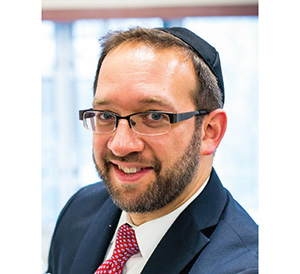
At the start of every school year we, perhaps not so coincidentally, revisit Sefer Bereishit and emerge renewed from the Yamim Noraim alongside the emergence of Adam Harishon. As we in the school setting acquaint ourselves with our new student body, we read of Hashem’s creation of man and the dynamic personality with which He endowed him.
Rav Soloveitchik observes that man was challenged to develop his personality by being forced to confront the world around him.
Hashem formed every beast of the field, and every bird of the air; and brought them to the man to see what he would call them; and whatever the man called every living creature, that was its name. (2:19-20)
“Adam becomes the arbiter. Suddenly he stopped marching with nature in the same direction; he turned his face to nature (in the opposite direction) and began to wonder, to examine, to reflect and to classify. Suddenly a schism developed… Man is no longer a non-reflective being that forges ahead in unison with a mechanistic natural process, but begins to single himself out, to confront nature in a mood of cognitive criticism and observation.” (“The Emergence of Ethical Man” p. 90)
Clearly, the act of coming in conflict or contrast with nature is what forged the sense of personality that Hashem desired to instill in Adam Harishon. A personality that served to endow Adam with the traits that would lead him to seek meaningful relationships with Hashem and people around him.
In partnering with parents on behalf of their sons, we often observe a similar phenomenon. Emerging young adults define themselves in contrast to those closest to them. As they begin to make important decisions about their beliefs, develop meaningful relationships and take more responsibility for their actions, teens tend to demonstrate their independence by charting different paths, or taking opposing positions from their family, friends and/or community. Extrapolating from Rav Soloveitchik’s comments, this would appear to be normal. It is the way Hashem created the very first dynamic, creative character of man.
This experience can be uncomfortable and challenging at times. After all, parents naturally have their goals and aspirations for their children, and often a concrete vision of how they want them to be as young adults. (Adam Harishon was being closely watched, but he didn’t have to live up to his European grandparents’ expectations.) Parents and grandparents hope for certain interests and character traits and inquire regularly to see that the next generation is carrying the family tradition. It can be frustrating for a parent who is passionate about Halacha to watch their child take serious interest in chasidut. It can be even more concerning when a child chooses a very different social group or demonstrates little interest in aspects of Torah life to which parents adhere closely.
In fact, the Chizkuni writes that an important benefit of removing the priesthood from the firstborn and assigning it to Aharon and his children was that no child would grow up in a home with a father who had a different set of Torah obligations from him. Whereas had the priesthood remained with the firstborn, you could have a family structure in which the firstborn son has obligations his father never encountered. There is critical value in being able to identify and align with one’s parents.
Nevertheless, the phenomenon we described is the way in which children develop their identity. It is not an implicit rejection of one’s family values. It is the process by which children construct their personalities and define their independence. In truth, I might argue that even when a child shows no signs of the above and is fully in line, almost eerily so, with his or her parents, it is likely the result of his or her having chosen to contrast with things outside the home and is still fully engaged in the same process.
It is interesting to observe that very often, when we catch up with students who have struggled with this experience, we find them living lives very similar to their parents. Parenting the way they were parented, taking roles in the community similar to the roles their parents played, establishing social groups that reflect those they witnessed growing up, and selecting a shul or community that is similar to the one they attended as a child. Clearly, our children are learning way more from us and are characterized by our values far more than we realize at times.
One of our greatest chinuch challenges is managing our expectations of our teens as they develop their personalities during the teenage years. We often exchange blessings with the language recorded in the Talmud (Taanit 5b) “that your offspring should be just like you,” and wonder if that is in fact the case. Here too, we take guidance and inspiration from the Creator Himself and adopt His eternal faith in the greatness of man. We are moved by how He guided our Avos, even as they struggled at times. We are astonished by His giving of the Torah, knowing full well that the people who announced “Na’aseh V’Nishma” were the same people who were about to worship the golden calf, and we are inspired by His unending commitment to our future even as we falter. Following His lead, we too need to show our tremendous faith in our children’s ability to thrive as Modern Orthodox Torah Jews, proactively guide them when they struggle to define themselves, and maintain our commitment to their success even as they exert their independence.
By Rabbi Asher Yablok
Rabbi Asher Yablok is head of school at Torah Academy of Bergen County in Teaneck.










